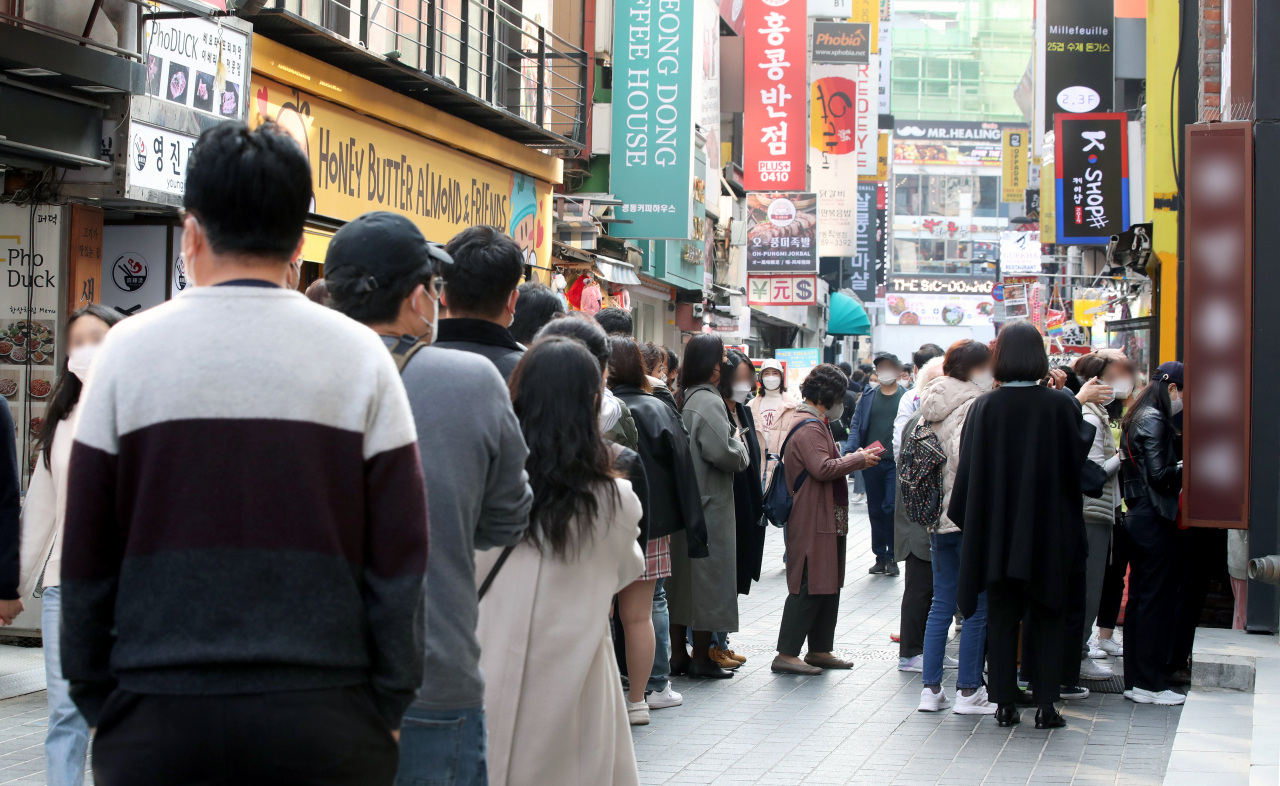[Pressure points] Lingering after meals during peak hours. Courtesy needed?
By No Kyung-minPublished : Feb. 11, 2024 - 16:01

At Korea's busy eateries, diners lingering after eating often get disapproving looks from restaurant owners or those still waiting for a table.
While this tension between leisurely dining and the demand for tables exists elsewhere, it can be highly pronounced in South Korea, where meals typically don’t include a dessert course and the focus of diners is often more on the eating itself, rather than on conversation.
In online discussion forum Nate Pann last December, an anonymous poster vented their frustration about a group of customers who chose to remain at their table despite having finished eating, while a lengthy queue of 30 to 40 people was still waiting to get seated.
This post fueled an online debate about whether consideration for a restaurant's table turnover rate -- and thus how much profit an eatery can generate in a certain period of time -- should trump everything else, even customers enjoying post-meal conversation.
'Go to a cafe to chat'
In reactions to the post, many fumed at the perceived impropriety of the specific group of lingering customers -- a party of three women as reported by the post's anonymous author -- who allegedly stayed at their table for approximately 30 minutes after finishing their meal.
Most commenters did not take issue with the post-meal chat itself. Rather, their concern lay more with the fact that the conversation took place as a long line of other customers were still waiting to get into the restaurant.
“It should be regarded as a ‘minpye,' when more than 30 customers are waiting; it's not like there wasn't anyone waiting,” reads one comment. In Korean, "minpye" refers to behavior or actions that cause discomfort or harm to others.
Some commenters put forward a practical alternative: proposing that the group could have headed to a nearby cafe to spend more time together without inviting disapproving looks.
"(In Korean) A 'restaurant' is (literally) a 'place to eat,'" argued Kim Jun-sung, a 30-something office worker. "Once you've accomplished eating, feel free to engage in conversation for as long as you'd like -- at a cafe."
He also mentioned that this act would demonstrate consideration for those still waiting to be seated outside the restaurant.
From the owner's perspective, some commenters offered tips to the author of the original post on how tactfully and subtly to encourage customers to leave.
“Approach their table with a smile and inquire if they have finished their meal and if it’s alright to clear their table,” one commenter suggested. “Most would comply and leave, but if they ask why, politely explain that it’s to serve waiting patrons more promptly later.”
Consideration for whom?
On the other hand, those who sided with the lingering customers emphasized that it is not mandatory for customers to be considerate of other patrons.
"Expressing consideration for others deserves appreciation," reads one comment. "But please do not label those who choose not to do so as if they were committing a misdemeanor."
Moreover, one commenter recommended that the restaurant consider enlarging its premises if it continually attracts such a large number of customers.
"Shouldn't the restaurant prioritize being considerate to its customers? Why expect only the customers to be considerate to the restaurant?" the commenter asked.
Park Min-gyu, a graduate student in Seoul, remarked that there is no consensus on the amount of time it takes or should be allowed for dining in the first place.
"It's perplexing if the owner expects customers to leave, when there’s no time limit to stay in the restaurant or anything," he commented. "While most people leave within 10 minutes after finishing their meal, the owner cannot simply assume that all customers will be as quick to depart."
In addition, some questioned how exactly how much conversation would still be within the bounds of courtesy. “Isn't 30 minutes acceptable, as long as it's under an hour?"
What are your thoughts? Share your opinion on this issue with us at content@heraldcorp.com
"Pressure points" delves into the seemingly trivial, yet surprisingly contentious topics that ignite debate in our everyday lives. -- Ed.



















![[Today’s K-pop] Treasure to publish magazine for debut anniversary](http://res.heraldm.com/phpwas/restmb_idxmake.php?idx=642&simg=/content/image/2024/07/26/20240726050551_0.jpg&u=)